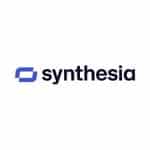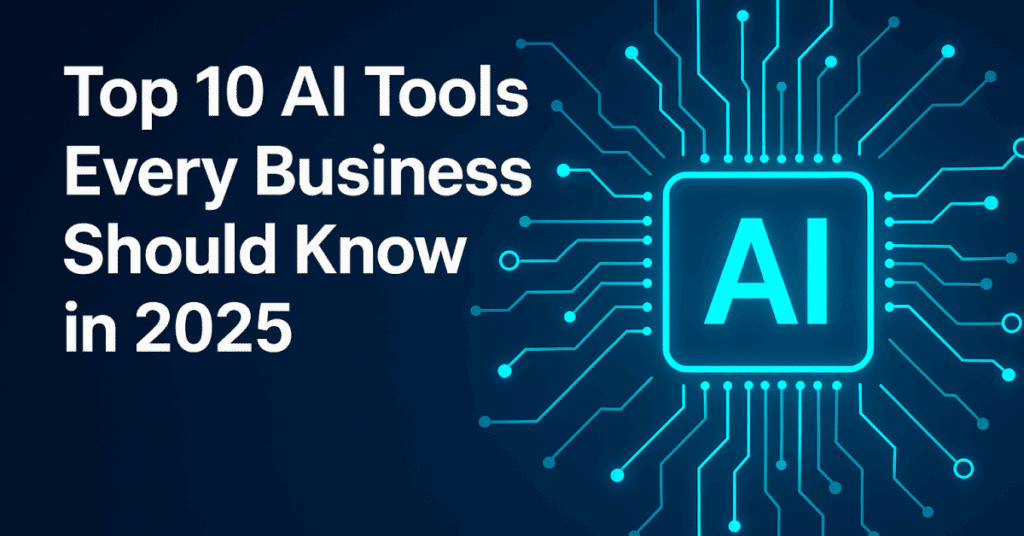In the ever-evolving landscape of business technology, artificial intelligence (AI) has become a cornerstone for innovation and operational efficiency. From automating workflows to analyzing data and enhancing customer experiences, AI tools are helping businesses of all sizes scale smarter and faster.
As we move deeper into 2025, staying ahead means knowing which AI tools are leading the way. Below is a curated list of the top 10 AI tools every business should know—each one offering unique capabilities to solve real-world business challenges.
1. ChatGPT Enterprise by OpenAI

Best for: AI-powered communication, content generation, and coding assistance
Keywords: generative AI, enterprise AI assistant, AI chatbot
ChatGPT Enterprise is more than just a chatbot—it’s a fully-fledged AI assistant designed for business productivity. Powered by OpenAI’s most advanced model, it helps teams with everything from writing content and drafting emails to coding, summarizing meetings, and analyzing large datasets.
Key Features:
- Unlimited access to GPT-4o (multimodal capabilities)
- Advanced data analysis tools
- Enterprise-grade security and admin controls
Use Cases:
- Internal knowledge retrieval
- Sales and marketing copy
- Customer support automation
2. Jasper AI

Best for: Marketing content creation
Keywords: AI writing tool, marketing automation, copywriting
Jasper AI specializes in AI-generated marketing content tailored to your brand voice. Its intuitive interface and templates make it easy to create blog posts, ad copy, and email campaigns.
Key Features:
- Custom tone-of-voice training
- Multilingual support
- Workflow integration for teams
Use Cases:
- SEO blog writing
- Social media content
- Product descriptions
3. Notion AI

Best for: AI-powered productivity and documentation
Keywords: AI note-taking, team collaboration, AI workspace
Notion AI is transforming how businesses manage information. Integrated into the Notion workspace, it helps teams write, summarize, brainstorm, and translate content without leaving the app.
Key Features:
- Automatic meeting summaries
- Actionable to-do lists
- Real-time document edits
Use Cases:
- Knowledge management
- Project documentation
- Brainstorming sessions
4. Synthesia

Best for: AI video creation
Keywords: AI video generator, training videos, virtual presenter
Synthesia allows businesses to create professional AI-generated videos using digital avatars and voiceovers—no camera or studio required.
Key Features:
- 140+ AI avatars and 120+ languages
- Easy script-to-video interface
- Brand customization
Use Cases:
- Employee onboarding
- Product demos
- Internal training
5. Fireflies.ai

Best for: AI meeting transcription and productivity
Keywords: AI meeting assistant, voice transcription, automated notes
Fireflies.ai is an AI-powered meeting assistant that records, transcribes, and summarizes conversations across platforms like Zoom, Google Meet, and Microsoft Teams.
Key Features:
- Voice-to-text transcriptio
- Keyword-based search
- CRM and Slack integrations
Use Cases:
- Meeting documentation
- Action item tracking
- Sales call analysis
6. Runway ML

Best for: Creative teams using AI in media production
Keywords: generative video, AI video editing, content creation
Runway ML is pioneering AI for video and design. It allows users to generate, edit, and enhance media with tools powered by generative AI.
Key Features:
- Text-to-video generation
- Background removal
- Inpainting for video
Use Cases:
- Marketing visuals
- Social media content
- Visual storytelling
7. Eightfold AI

Best for: AI-driven talent acquisition and HR
Keywords: AI recruiting software, HR automation, workforce planning
Eightfold AI uses deep learning to help organizations find, hire, and retain top talent. Its talent intelligence platform analyzes millions of data points to match candidates with the right roles.
Key Features:
- Talent matching and ranking
- Diversity and bias control
- Skills-based workforce planning
Use Cases:
- Recruiting automation
- Internal mobility
- Succession planning
8. Hugging Face

Best for: Developers building custom AI models
Keywords: open-source AI, natural language processing, ML model hub
Hugging Face is a go-to platform for AI developers. Its open-source tools and libraries make it easy to deploy state-of-the-art models in natural language processing, computer vision, and beyond.
Key Features:
- Transformers library
- Model hosting and inference API
- Community collaboration
Use Cases:
- Custom chatbot development
- NLP-powered apps
- AI research and experimentation
9. Midjourney

Best for: AI-generated art and design
Keywords: AI image generator, creative design, generative art
Midjourney is an independent AI platform that turns text prompts into stunning visuals. Creative teams use it to prototype ideas, create brand assets, and explore design directions at scale.
Key Features:
- Text-to-image rendering
- Community collaboration tools
- Stylized artwork generation
Use Cases:
- Brand concept art
- Web and app design inspiration
- Creative storytelling
10. UiPath

Best for: Robotic process automation (RPA)
Keywords: AI automation, business workflows, digital workforce
UiPath is a leader in enterprise automation, helping businesses reduce manual workloads through intelligent RPA bots. It combines machine learning, computer vision, and rule-based automation.
Key Features:
- AI-assisted task automation
- Workflow orchestration
- Analytics dashboard
Use Cases:
- Invoice processing
- HR onboarding workflows
- IT support automation
Why AI Tools Matter More Than Ever in 2025
The business world is more data-driven and automated than ever. AI tools are not just “nice to have”—they’re mission-critical. Here’s why:
- Efficiency at scale: Automate repetitive tasks, freeing up human talent for strategic thinking.
- Smarter decision-making: Use real-time insights from AI analytics to drive outcomes.
- Competitive edge: Leverage generative AI for faster product development, marketing, and customer service.
Choosing the Right AI Tools for Your Business
When evaluating AI software for your company, consider the following:
- Scalability: Can it grow with your business?
- Integration: Does it connect with your current tools (CRM, ERP, etc.)?
- Security & Compliance: Is it compliant with GDPR, SOC 2, or industry-specific regulations?
- Ease of Use: Can non-technical team members use it effectively?
- Support & Community: Are resources, documentation, and help readily available
Final Thoughts
AI is redefining how businesses operate in 2025—from startups to global enterprises. Whether you’re automating back-office tasks, enhancing customer experiences, or creating personalized content, these top 10 AI tools offer transformative potential.
By embracing the right solutions, you’ll be better equipped to innovate, compete, and thrive in the AI-powered digital age
Quick Look: The Best Writing Tools In Microsoft 365

